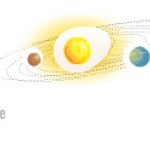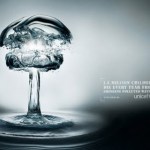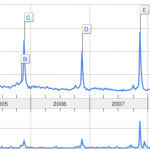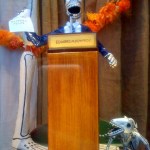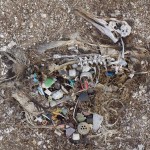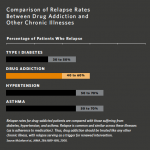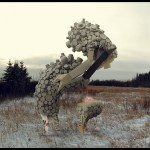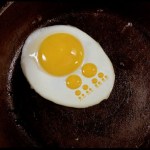Science in Culture & Policy
NPR now has its own science-meets-culture blog, 13.7:
13.7: Cosmos And Culture is written by five prominent scientists or science journalists with different fields and focuses. The five will write, as individuals and sometimes collectively, on the places where science and culture intersect, on all levels. The blog will at sometimes be provocative, controversial, amusing, idealistic, academic, insightful - but always thoughtful. The contributors to this blog stand by the conviction that scientists must engage in the public debate of what science can and cannot do.
All well and good, but I was…
A question I used to get fairly frequently is "what medical advance has saved the most lives?" Guesses usually include antibiotics, vaccines, and septic surgical method, but it's probably. . . clean water. Not a medical advance, you say? Maybe not, at least the way most people think of medicine - but sadly there are still many parts of the world that can't take clean water for granted.
Via John at Tracing Resistance Blog.
Oooh, look! "Science Czar" John Holdren has recommended Chris & Sheril's Unscientific America in Foreign Policy Magazine's Global Thinkers Book Club.
It's so nice to see the two topics most likely to draw hecklers to my blog, brought together at last! Maybe all the angry right-wingers and New Atheists will cancel each other out. . . ? Nah, Santa's not that good to me. Sigh.
Albert Einstein has never reminded me much of Dr. Evil. Quite the opposite, in fact. But even Einstein occasionally had to ask for one MEEEEL-LION dollars - for a good cause, of course:
Dear Friend:
I write to you for help at the suggestion of a friend.
Through the release of atomic energy, our generation has brought into the world the most revolutionary force since prehistoric man's discovery of fire. This basic power of the universe cannot be fitted into the outmoded concept of narrow nationalisms. For there is no secret and there is no defense; there is no possibility of control except…
Pop quiz: this Google Trends chart represents searches for what word or phrase?
the answer? a word that the vast majority of people never use - except on Thanksgiving.
Go chemistry! :)
I'm currently attending the Grand Opening of the new Laboratory at Harvard University, "an exhibition and meeting space for student idea development within and between the arts and sciences," for a special colloquium on Art, Science, and Creativity featuring David Edwards (author of ArtScience), Lisa Randall, and others. This is awesome. Stay tuned for a report tomorrow.
Magnetic Movie from Semiconductor on Vimeo.
Last week, at the imagine science film festival in New York, Magnetic Movie won the Nature Scientific Merit Award:
In 2009, the Nature Scientific Merit Award went to the film judged to be not only the most deserving but also the most scientifically accurate, Ruth Jarman and Joe Gerhard's Magnetic Movie.
I love Magnetic Movie, too - but what think you about the scientific accuracy angle? See what I had to say about it in my Art vs. Science series, earlier this year:
Art vs. Science, Part One: Semiconductor
Art vs. Science, Part Two: You want raw data…
Since I posted last night, DrugMonkey, Dr. Free-Ride, and the Intersection have also checked in with their POVs on this issue. I particularly liked this comment from Dr. Free-Ride:
We get to foot the bill for the effects of other people's "moral failings" here as it is. Why, then, should it be so objectionable to consider spending some public money to figure out how to help people stop? Is it so important that people be punished for their moral failings that we're willing to sustain large-scale societal collateral damage just to enact that punishment?
DrugMonkey linked to a list of talking…
My mom, like millions of others in the U.S., has been a smoker for decades. She's tried to quit a few times, but it's been hard for her. The thing that's helped the most so far? The nicotine patch.
While the patch is not a universal cure - see the Mayo Clinic's analysis here - physicians back them because, well, the long-term cost of remaining a smoker is too high (for the smoker, the smoker's family, and society). We all know smokers, and love them, and want to help them quit. Right?
But there's a huge double standard in the media, and in society in general, when it comes to drug abuse…
*That's the Amazon rainforest - not Amazon.com!
Check out this interview from MAKE with Google's Rebecca Moore, who helped an Amazon chief use Google Earth to fight illegal logging.
Lots more here.
One of the coolest, weirdest, worlds-colliding Day of the Dead artworks I've ever seen is this sculpture of a skeletal Teddy Kennedy. He's at a podium, open-jawed (no doubt haranguing other late Senators), accompanied by a skeletal dog.
The paper in his hand says "Health Care: The Cause of My Life." I realize this is a terrible photo, but in person, I actually found it pretty moving.
From the window of Nomad on Mass Ave in Cambridge, MA - they have an extensive Dia de los Muertos folk art collection.
Happy Halloween!
Heartbreaking photos of albatross chicks, by photographer Chris Jordan:
These photographs of albatross chicks were made just a few weeks ago on Midway Atoll, a tiny stretch of sand and coral near the middle of the North Pacific. The nesting babies are fed bellies-full of plastic by their parents, who soar out over the vast polluted ocean collecting what looks to them like food to bring back to their young. On this diet of human trash, every year tens of thousands of albatross chicks die on Midway from starvation, toxicity, and choking.To document this phenomenon as faithfully as possible,…
"Mechanical heart"
Bill McConkey
Collage of a digitally enhanced pencil drawing of the human heart and photographs of different brass instruments. Digital artwork. From the Wellcome Image Awards 2009 - see the other winners here.
Last week was Open Access Week, which meant I got to hear a great talk from John Wilbanks of the Science Commons (you should subscribe to their blog!) I've been thinking a lot this week about the legal challenges of data sharing, which is giving me a headache. But there's an easier way to celebrate Open Access Week: by visiting the Guardian's a multimedia show about…
From the NIDA media guide
Jared Diamond and the New Yorker's parent company have denied all charges in the "Vengeance is Ours" scandal:"
The defendants' attorneys listed 34 reasons, called "affirmative defenses," why they should prevail in the lawsuit. Among them are the contentions that the plaintiffs were not defamed and had not suffered any harm or actual injury to their reputations; that Diamond and The New Yorker had not acted with "actual malice" or with knowledge that The New Yorker story was false; that the article was "substantially true" and thus protected under the First and 14th…
From Inhabitat: Artist Brandon Jon Blommaert's recycled trash robots (yes, they're real sculptures) lay waste to Photoshopped landscapes. Check out his flickr page for more - and a "making of" series of photos showing how he built these steampunky robot overlords, who are destined for a Canadian recycling center. Their message is clear: RECYCLE, HUMANITY, OR BE EXTERMINATED!
Thanks to reader Todd F. for the heads-up!
NPS Photo/Dan Stahler
This fall, Montana opened a sport hunting season - on wolves. Yeah - the same wolves that wildlife biologists have been working so hard (and spending lots of federal money) to successfully reintroduce to restore the Yellowstone ecosystem. So what happened? It really isn't that surprising: hunters have already killed nine wolves in the wilderness area near Yellowstone's northern border - including both the radio-collared alpha and beta females of Yellowstone Park's Cottonwood wolf pack. Uh. . . oops.
And what do Montana authorities have to say about this?
"Members of…
Just saw this posting:
The Stetten Fellowship seeks to encourage postdoctoral historical research and publication about biomedical sciences and technology and medicine that has been funded by NIH since 1945. Fellowships carry a stipend in the range of $45,000 per year and include health insurance and a work space, computer, and phone in the Office of NIH History. (Fellowships may be renewable to a maximum of 24 months, subject to satisfactory progress.) Stetten Fellows have access to the resources of the Office of NIH History, the collections of the Stetten Museum, the National Library of…
Kantor Set
Kevin Van Aelst
Several readers have suggested I blog about photographer Kevin Van Aelst in the past weeks. If you've missed out on his work, Kevin is the sort of artist who can portray cellular mitosis in the legendarily difficult medium of Krispy Kreme, or chromosomes in gummi worm, fingerprints in non-dairy creamer, or the Kantor Set in egg yolk. His work is clever, funny, and meticulous to a fault.
Circulatory System (Heart On Your Sleeve), 2009
Kevin Van Aelst
Here's what the artist has to say:
While the depictions of information--such as an EKG, fingerprint, map or…
Just got in from a really interesting talk by Viktor Mayer-Schonberger, author of Delete: The Virtue of Forgetting in the Digital Age. Mayer-Schonberger's concern is that with a shift to digital modes of storage, we've transitioned from a biologically hardwired default of forgetting information, to a default of remembering. It's literally gotten harder to erase certain types of information than it has to retrieve it. Many types of ephemera just aren't ephemeral anymore.
Why is this a problem? In addition to swamping us with unwanted, outdated information we'd all rather forget (high school…
Cajal's Revenge, 2007
Katherine Sherwood
It's been a while since I've been able to focus on my Art vs. Science series of posts, so I understand if you've forgotten Part One and Part Two. A quick recap: in Part One, I asked,
I think that lay audiences approach scientific art differently - perhaps more credulously - than they do other forms of art, simply because lay audiences feel insecure and uncertain about basic science. Audiences may have so much respect for science, that they extend respect reflexively when science appears in other contexts - like art or entertainment. Anyone who's had…
